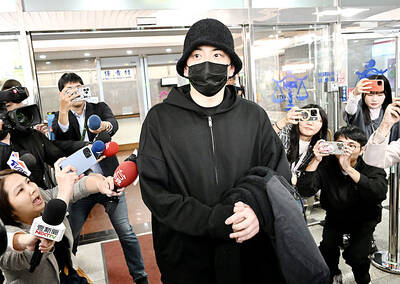More than 2,500 public schools and government offices are using 19,256 blacklisted Chinese communications and electronic devices, raising national security concerns, a National Center for Cyber Security Technology (NCCST) report said.
The report, released late last month, showed that many of the blacklisted products were from Shenzhen-based Da-Jiang Innovations Technology (DJI, 大疆創新), which makes drones and cameras for aerial photography.
The Executive Yuan has previously instructed schools and government offices to report back on their use and installation of blacklisted communications and electronic devices, which are to be replaced by the end of the year.
If they are not replaced, due to budget constraints or other reasons, then the school or agency must obtain an exemption from the Executive Yuan, and give a date for when the devices would be removed.
The report showed that 2,596 government offices and schools, including public high schools, colleges and universities, are using 19,256 Chinese devices and systems.
Most of the devices were made by companies on the government blacklist, meaning that government agencies and public schools are prohibited from using them due to concerns that sensitive or confidential information could be leaked.
The report showed that 1,848 products at 717 schools and government offices were made by DJI, followed by 1,632 products at 423 schools and offices made by TP-Link Technologies (普聯技術), which specializes in computer networking products.
Video surveillance equipment maker Hangzhou Hikvision Digital Technology (海康威視) made 1,076 products in use at 309 schools and government offices, the report showed.
Legislators and pundits have voiced national security concerns over the use of Chinese communications equipment, especially as major Chinese firms have large market shares and can undercut competitors on pricing.
The report showed that 99 percent of public schools and government agencies had complied by March to a request to report their use of such devices.
The center said that many Chinese e-books, history texts, periodicals and journals area also used at the schools and offices.
Digital information services were found to be used mainly in telecommunication systems for external trade and diplomatic offices in foreign countries, as well as for research programs focused on cross-strait legal policy studies and on services for promoting events, the report showed.
Much of the software for information technology and digital recording equipment are used by research centers, academic studies and for teaching, the center said.
Many devices and systems are used for teaching, land surveying, communication networks for small offices and security at government buildings, the report showed.
The Chinese equipment was often chosen because of the low cost due to budget constraints or because it offered multiple functions, the report showed.

The National Immigration Agency (NIA) said yesterday that it will revoke the dependent-based residence permit of a Chinese social media influencer who reportedly “openly advocated for [China’s] unification through military force” with Taiwan. The Chinese national, identified by her surname Liu (劉), will have her residence permit revoked in accordance with Article 14 of the “Measures for the permission of family- based residence, long-term residence and settlement of people from the Mainland Area in the Taiwan Area,” the NIA said in a news release. The agency explained it received reports that Liu made “unifying Taiwan through military force” statements on her online

A magnitude 5.7 earthquake struck off Taitung County at 1:09pm today, the Central Weather Administration (CWA) said. The hypocenter was 53km northeast of Taitung County Hall at a depth of 12.5km, CWA data showed. The intensity of the quake, which gauges the actual effect of a seismic event, measured 4 in Taitung County and Hualien County on Taiwan's seven-tier intensity scale, the data showed. The quake had an intensity of 3 in Nantou County, Chiayi County, Yunlin County, Kaohsiung and Tainan, the data showed. There were no immediate reports of damage following the quake.

Actor Darren Wang (王大陸) is to begin his one-year alternative military service tomorrow amid ongoing legal issues, the Ministry of the Interior said yesterday. Wang, who last month was released on bail of NT$150,000 (US$4,561) as he faces charges of allegedly attempting to evade military service and forging documents, has been ordered to report to Taipei Railway Station at 9am tomorrow, the Alternative Military Service Training and Management Center said. The 33-year-old would join about 1,300 other conscripts in the 263rd cohort of general alternative service for training at the Chenggong Ling camp in Taichung, a center official told reporters. Wang would first

A BETRAYAL? It is none of the ministry’s business if those entertainers love China, but ‘you cannot agree to wipe out your own country,’ the MAC minister said Taiwanese entertainers in China would have their Taiwanese citizenship revoked if they are holding Chinese citizenship, Mainland Affairs Council (MAC) Minister Chiu Chui-cheng (邱垂正) said. Several Taiwanese entertainers, including Patty Hou (侯佩岑) and Ouyang Nana (歐陽娜娜), earlier this month on their Weibo (微博) accounts shared a picture saying that Taiwan would be “returned” to China, with tags such as “Taiwan, Province of China” or “Adhere to the ‘one China’ principle.” The MAC would investigate whether those Taiwanese entertainers have Chinese IDs and added that it would revoke their Taiwanese citizenship if they did, Chiu told the Chinese-language Liberty Times (sister paper